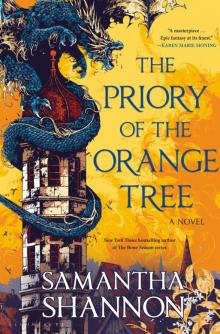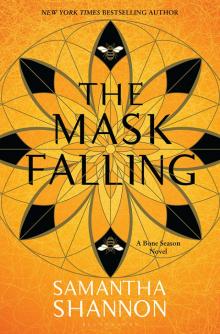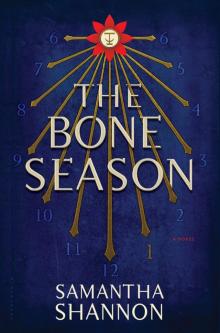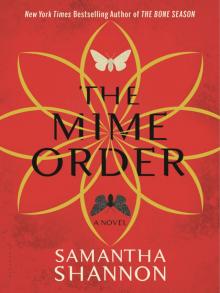- Home
- Samantha Shannon
The Mask Falling Page 2
The Mask Falling Read online
Page 2
Banked heat flickered in his eyes.
“You must be angry with me,” I said. “For giving myself up to Scion. For not telling anyone I had a plan.”
His attention dropped to my hands, which rested on his wrists. Half of my fingernails were black.
“I resented you. For eluding us all,” he said. “For knowing exactly what she does to those who defy her, yet still gambling with your life, all for a strategy with little chance of success.”
“I don’t regret it.” I whispered the confession. “It was the only way to destroy Senshield, and it had to be then.”
“To those of us who care for you, your life would not have been an acceptable exchange for that victory. Every night, I wished you had not thought it was. That you had not done it.” With the barest touch, Warden lifted my chin. “I also expected nothing less of you.”
I managed a short-lived smile.
With him beside me, I was calmer. All I wanted now was to be out of the water and into a bed. Warden moved to sit on the floor, while I reached for a cake of soap.
“Jaxon was in the Archon. He told me things.” The bathwater rusted around me. “He said it was the spirit of the Ripper that scarred you twenty years ago.”
Warden was silent for a long time.
“We were hung in chains to await our punishment, to learn whether we would be sequestered—executed—for our crimes,” he said. “That was not our fate. The Sargas do not destroy their fellow Rephaim lightly.”
“Nashira destroyed Alsafi.”
The skirr of her blade. The thump of his head. I had barely known Alsafi, yet he had sacrificed himself to buy me a chance to escape.
“That, I imagine, was a rare instance of passion. His betrayal must have incensed her,” Warden said. “No, the scars were a far more imaginative solution to our disloyalty, marking us forever as traitors.”
“Did you ever stop seeing the room where it happened?” I dragged a cloth up my arm. “Did you ever stop thinking you were still trapped there?”
Another silence.
“Some rooms,” he said at last, “are hard to leave.”
At least he was honest.
“I’m going to try to wash my hair,” I said. “I think I’m all right now.”
“Very well.”
He left me to it. With what little strength I had left, I dumped shampoo on my head and scrubbed my scalp until it stung, forcing myself to keep scouring and rinsing until all the blood and grime was gone. Only then did I let the water drain and slither out of the bath.
For a long while, I sat on the floor, shattered. It had taken so much to do something that had once been effortless. Fatigue rushed over me. Almost drunk with it, I levered myself up on straw legs, hair dripping. A bead of blood welled between the stitches on my arm.
Only once, in the three weeks I had been detained, had I been allowed to clean my teeth. The bristles on the brush turned pink. When I had used about a pint of mouthwash, I towel-dried my hair and drew on the nightshirt, pulling the buttons through the wrong holes.
I was dead on my feet by the time I emerged. Warden led me into a darkened room with a high ceiling, where a double bed waited by a window, heaped with blankets and pillows.
“You ought to sleep.” He let go of me. “You will feel your injuries soon.”
The space between us was taut with the knowledge of what was to come. Not just the war beyond the window—a war that would not wait for me to heal—but the one my body was about to wage against me.
“I will bring you a heat pad,” Warden said. I pressed my ribs. “Do you need anything else?”
“No.” I looked up at him, so tired I could hardly focus. “Warden … I know Terebell must have only let you come with me because none of the other Ranthen wanted the job. And I know it must be embarrassing to be demoted to minding a human.” Speaking was starting to hurt. “It might take me a while to recover. I don’t know if I ever will.”
“It is no demotion. No dishonor,” he said. “And you will not rush your recovery on my account.”
The gentleness in his voice almost broke me. Too exhausted for restraint, I turned back to him and nestled against his chest. Just for a minute, I wanted to be held. I wanted to convince myself that he was really with me, and not a drug-induced illusion. His arms came around me.
“Forgive me, little dreamer.” His voice resonated through us both. “For letting them take you.”
I closed my eyes. “I gave you no choice.”
His hand was a reassuring weight between my shoulders. I listened to his steady heartbeat, and mine slowed.
At length, I sat on the bed. Droplets seeped past my collar. Before I could swallow my pride and ask, Warden left the room and returned with a comb and a blow-dryer.
“You don’t have to,” I murmured.
“I am aware.” Warden sat at my side. “Lean on me.”
I did. Heat gusted through my hair. I sat between his arms, heavy-eyed and leaden, until he switched off the blow-dryer and guided me to the pillows.
“Sleep this way if you can.” He used them to prop me up. “It will make breathing easier.”
I was too drowsy to so much as nod. My hair feathered warmly against my cheek.
For a long time, I waited for the trap to spring. It was too much to hope, or to believe, that I could be warm and clean and safe. The part of my brain where fear dwelled was telling me, even now, that this room was a figment of a desperate imagination—that I was alone and condemned, and the executioner was on his way.
No one came. Outside, Paris was awake, and birdsong fluttered through the window.
Before the pain could reach me, I was gone.
PART I
To Pay Thee Free
Oh yes, I’ve got some gold for thee,
Some money for to pay thee free;
I’ll save thy body from the cold clay ground,
And thy neck from the gallows-tree.
– Child Ballad 95,
“The Maid Freed from the Gallows”
1
Beyond the Sea
SCION CITADEL OF PARIS
JANUARY 14, 2060
A blade flashed, kindled bright by moonshine. Death lathed thin and sleek. I thrashed against my chains, retching as if I had been washed up by the tide. Someone was stabbing me.
The basement with its blind gray walls. The light, so bright it scored circles on my vision. And the water—I was choking on it. Suhail Chertan loomed from the shadows and stretched a gloved hand toward the lever.
Instinct led me to the lamp. My bedroom in Paris snapped into relief. As quickly as the fear had hit, I remembered that the shackles were only sheets, that the blade and the white-knuckled hand that grasped it were both mine, and that I was fighting my own memory.
Cold sweat dripped from my hair. Each breath strained through leagues of bruising. The alarm clock glowed—12:23 a.m.—and I was gripping the knife I kept under my pillow.
Some nights it was the waterboard, or the bleach-white room where the Vigiles had beaten me. Some nights it was the Dublin Incursion. I would have taken insomnia over this: sleeping too deeply and for too long, only to wake with no tether to reality, half-trapped in the past.
The door to my room opened. “Paige.”
I wiped my brow with my cuff.
“I’m all right,” I said. “I just thought—” Wisps of my hair clung to my temples. “Was I screaming?”
“No. You were speaking.”
In the Archon, I had not asked for mercy. In my sleep, I often did.
“Since you are awake, I wonder if you would care to join me in the parlor,” Warden said. “Unless you wish to rest.”
“No, it’s fine. I won’t be sleeping again.” I coughed. “Give me a minute.”
“I will need ten. Wear a coat.”
This was mysterious even for him. Curiosity kindled, I untangled myself from the sheets.
The safe house was on Rue Gît-le-Cœur, in the ancient heart of Paris,
a skip and a jump from the River Seine. Two weeks had passed since our arrival. In that time, I had seen no evidence of neighbors. Past whatever legal shadows were in place, I suspected all the nearest buildings belonged to Scarlett Burnish, or the organization that secretly employed her.
The Domino Program. The network of spies that supported Burnish and had ordered her to get me out of the Westminster Archon. As yet, I had no idea what they wanted from me—only that they had risked a valuable agent to save me from the executioner.
Once I was warmly dressed, I went to the parlor. A sweet scent hung in the air, the record player crooned, and a note waited on the table.
The locked door.
I raised an eyebrow.
One door in the parlor had been locked when we arrived. Now it was ajar. I padded up the wooden stairs beyond, to a deserted attic, and climbed a ladder into the night.
Warden gave me a hand through the hatch. We stood side by side on the roof of the safe house, beneath the stars.
“Well, look at that,” I breathed. “Who knew we had a view like this?”
The snow-covered quay trimmed the river with lace. Beyond it were the louring rooftops of the Île de la Citadelle, home of the Inquisitorial Courts and the Guild of Vigilance.
“I suppose Domino did not mean for us to access the roof,” Warden said, “but when I found the key, I thought we might use it to celebrate.”
“Celebrate what?”
He nodded to something behind me. I turned.
On a flat section of the roof, overlooking the Seine, a rug had been rolled out. Candles flickered in jars around dishes of food, which surrounded a small and ornately decorated cake.
It was past midnight. My twentieth birthday. After everything, it had slipped my mind.
“I know this is a modest celebration.” Warden spoke to the chimney. “After all you have endured, you deserve—”
“Warden.” I gave his wrist a brief squeeze. “It’s perfect.”
That made him look back at me. No smile. Unlike humans, Rephaim rarely signaled their thoughts or emotions through facial expressions, but his features softened a little—at least, I liked to think they did. I liked to think I was learning to read him.
“Many happy returns of the day, then, Paige,” he said.
“Thank you.”
We sat on the rug, Warden with his back against the chimney. I swung my legs over the edge of the roof and basked in sweet, unbottled air. He knew I had been restless indoors. Here, I could lie under the stars without risk.
He had somehow assembled a picnic for me. A cheese board accompanied by sliced bread and butter. A bowl of crisp salad, tiny potatoes and hard-boiled eggs nestled among its leaves. Pears and red apples and oranges. Pastries so delicate they looked as if they would vanish if I picked them up. There was even a dish of sugar-roasted chestnuts—my favorite.
“Where did you get all this?” I went straight for a chestnut. “Don’t tell me you made it from scratch.”
“I am not so impressive. Albéric delivered it at my request.”
Albéric was the contact who provided our supplies. Even though all our requests had been fulfilled—Warden had illegal wine, I had coffee—I had never seen our mysterious benefactor come or go.
“Cake was, apparently, not available,” Warden continued. “I acquired this one elsewhere.”
A smile pulled at the corners of my mouth. “Are you saying you stole me a birthday cake?”
“A tribute to your vocation, Underqueen.”
My smile widened.
We listened to Paris. Citadels were never silent. Blue tone, Nadine called it—that low and ceaseless roar, like one long exhalation, the rush of lifeblood through vein-like streets. Sirens and traffic and an undersong of voices from the transmission screens, which spoke all the way through the night. I took a bite from a wheel-shaped pastry filled with praline cream.
“A drink?”
Warden was holding a silver jug. “What is it?” I asked.
“Le chocolat chaud.” His voice deepened when he spoke French. “Do you care for chocolate?”
“I do,” I confirmed.
He poured some into a gold-rimmed demitasse and passed it to me. It was thick and sweet as molasses. I sipped it between bites of food.
For our first week here, I had barely eaten. Now I was ravenous. Once I had sampled everything, I made a start on the cake, which was swathed in coffee-flavored icing. It had been a long time since I tasted something so good, something meant to give pleasure.
“What would happen if you had a bit of this?” I asked Warden as I cut a second wedge.
“I would rather not say while you are eating.”
“Now I’m really curious.”
He waited until I had finished my next mouthful before he said, “I would vomit.”
A surprised laugh burst out of me. “You’re joking.”
“I think we can agree that humor is not my forte.”
“Don’t be so hard on yourself. You have a firm handle on unintentional humor.” A gust of wind blew my hair into my eyes. “So you’d throw up if you tried to eat. But you can drink.”
“Nothing thicker than broth. I cannot digest solid food.”
“Do you not have a stomach?”
“I do not know which organs I possess in your terms. Rephaim have never consented to physical examination by humans. Nashira prefers to keep our anatomy a well-guarded secret.”
“Right. Otherwise we might be able to design weapons that can harm you.”
“Precisely.”
I had so much to learn about the Rephaim. Now I had Warden to myself, I meant to caulk the gaps in my knowledge.
“Well,” I said, “I’m sorry you’ll never know the joy of cake. But more for me, I suppose.”
“Indeed.”
I polished off the rest of my slice. Comfortably full, I lay back on the rug to stargaze, watching my breath rise like steam from a kettle.
It felt like eons since my nineteenth birthday. A year ago, Nick had baked me a strawberry cake and served it for breakfast, and Jaxon had afforded me nineteen minutes off to eat it (“What could be a better gift than a day of hard work for your mime-lord, darling?”). Later, Nick had given me an exquisite chatelaine he had wrangled at the black market and a stack of records for my collection, and we had gone out with Eliza for a slap-up supper.
We had been happy then, in the corner of the world we had scratched out for ourselves. I had been able to close my eyes to the real Scion and pick a living from the bones it tossed me.
Warden lay on the rug beside me and folded his arms under his head. It was such a relaxed, human posture, I had to look again.
“Thank you for this,” I said to him. “And for everything you’ve done since we arrived. I know I haven’t been much company.”
“You are not here to entertain me.”
One had to wonder what he really thought about birthdays. To an immortal, it must seem masochistic, to celebrate each step of my journey to the grave. Still, it was sweet of him to play along.
A row of three stars flickered right above the safe house. “Rephaim are named after stars. Their old names, I mean,” I murmured. “Why is that?”
“Most humans cannot speak our true names. Since your kind have long associated stars with the divine, Nashira decreed that we would use their names here.”
“Did you all choose your own?”
“After consulting the æther,” Warden said. “On the subject of my name, I never did invite you to call me by it.”
“Arcturus?”
“Yes. Warden is a title—a title that was stripped from me, at that,” he said. “We have known each other for almost a year. If you wish, you are welcome to call me Arcturus.”
He had a point. I should have stopped calling him Warden months ago, but to me, it had become a name. Or perhaps I had used it to draw a line between us—a tissue of formality that kept me from growing too close to him. Whatever the reason, it was long pa
st time.
“I’d like that,” I said. “Arcturus.”
Another siren in the distance. Somewhere in the night, Nashira Sargas was considering her next move.
I had always had a healthy fear of her power and her reach. I had always known that, in the end, she was the one we would have to defeat to win this war. Yet before my imprisonment, Nashira had never kept me up at night. There had always been a reassuring sense of distance.
No longer. I had seen the fire in her eyes when I escaped her clutches for the second time. After everything I had done to defy her, I had also refused to break. I had refused to be silent. I had refused to die. She would never give up her pursuit.
A tiny sound drew me back to the present. Warden—Arcturus (it would take a while to get used to that)—had placed a small object beside me.
“A gift.”
It was an oblong parcel, neatly wrapped in newspaper. “Arcturus—” I sat up. “You didn’t have to get me anything.”
“I was under the impression that a gift was traditional on the anniversary of a womb birth.”
“Womb birth. Great.”
The parcel was heavier than I had expected. I opened it with care to reveal an ornate box. A moth gleamed on its oval lid, fashioned from smoked glass, perched on a bell-shaped oat blossom. I remembered telling him once that it was my favorite. In the language of flowers, it meant the witching soul of music.
I turned a gold key on the side of the box. The lid opened, and a figurine of a bird—a ring ouzel, black with a pale breast—emerged from inside. It beat its tiny mechanical wings and whistled like a living thing.
“Arcturus,” I said softly. The artistry of it was exquisite. “Where on earth did you get this?”
“Originally, it was one of my snuffboxes. Now it is a boîte à oiseau chanteur.”
A songbird box. “It’s beautiful.” I looked at him. “Wait, you made it by hand?”
“A modest conversion.”
Even the underside of the lid was stunning, painted to resemble a poppy field. He moved to sit beside me and turned the key the other way. The bird stopped moving, and instead, the box played music. As I listened, I had a muted recollection of my grandfather restoring a harp in his workshop, singing in his pebbly voice. An air about a long-lost soulmate.

 The Priory of the Orange Tree
The Priory of the Orange Tree The Dawn Chorus
The Dawn Chorus The Mask Falling
The Mask Falling The Bone Season
The Bone Season The Mime Order
The Mime Order The Song Rising
The Song Rising The Pale Dreamer
The Pale Dreamer